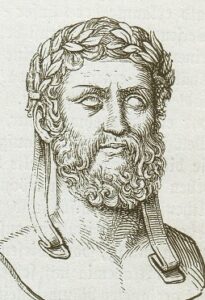Apologia Xenophon 007

Apología de Sócrates
(15-16)
Tabla de contenidos
Ἀπολογία Σωκράτους 007
[15] Ὡς δ᾽ αὖ ταῦτ᾽ ἀκούσαντες οἱ δικασταὶ ἔτι μᾶλλον εἰκότως ἐθορύβουν, αὖθις εἰπεῖν τὸν Σωκράτην· Ἀλλὰ μείζω μέν, ὦ ἄνδρες, εἶπεν ὁ θεὸς ἐν χρησμοῖς περὶ Λυκούργου τοῦ Λακεδαιμονίοις νομοθετήσαντος ἢ περὶ ἐμοῦ. λέγεται γὰρ εἰς τὸν ναὸν1JDGB: νεὼ. εἰσιόντα προσειπεῖν αὐτόν· φροντίζω πότερα θεόν σε εἴπω ἢ ἄνθρωπον. ἐμὲ δὲ θεῷ μὲν οὐκ εἴκασεν, ἀνθρώπων δὲ πολλῷ προέκρινεν ὑπερφέρειν. ὅμως δὲ ὑμεῖς μηδὲ ταῦτ’ εἰκῇ πιστεύσητε τῷ θεῷ, ἀλλὰ καθ᾽ ἓν ἕκαστον ἐπισκοπεῖτε ὧν εἶπεν ὁ θεός. [16] τίνα μὲν γὰρ ἐπίστασθε ἧττον ἐμοῦ δουλεύοντα ταῖς τοῦ σώματος ἐπιθυμίαις; τίνα δὲ ἀνθρώπων ἐλευθεριώτερον, ὃς παρ᾽ οὐδενὸς οὔτε δῶρα οὔτε μισθὸν δέχομαι; δικαιότερον δὲ τίνα ἂν εἰκότως νομίσαιτε τοῦ <οὕτω>2JDGB: Hoc verbum addidit. πρὸς τὰ παρόντα συνηρμοσμένου, ὡς τῶν ἀλλοτρίων μηδενὸς προσδεῖσθαι; σοφὸν δὲ πῶς οὐκ ἄν τις εἰκότως ἄνδρα φήσειεν εἶναι ὃς ἐξ ὅτουπερ ξυνιέναι τὰ λεγόμενα ἠρξάμην οὐπώποτε διέλειπον καὶ ζητῶν καὶ μανθάνων ὅ τι ἐδυνάμην ἀγαθόν;
Perge ad initium paginae huius
Apologia Sōcratis 007
[15] A estas palabras, y como era de esperarse, los jueces se alborotaron mucho más; y Sócrates, tomando una vez más la palabra, dijo: «Y no obstante, varones, el Dios dijo en oráculos acerca de Licurgo, el legislador de los Lacedemonios, mayores cosas que sobre mí. Se dice, en efecto, que en el momento de entrar Licurgo en el templo, exclamó: ‘no sé si he de llamarte hombre o dios’. Pues a mí no me comparó el oráculo con dios alguno; solamente dijo que supero en mucho a los demás hombres. No creáis, con todo, demasiado a la ligera este oráculo del Dios, sino examinad detalladamente lo que dice el Dios. [16] ¿Conocéis hombre alguno menos siervo que yo de los apetitos del cuerpo, alguno más independiente que yo, que de nadie recibo ni dones ni salario? Y ¿.a quién razonablemente podríais considerar por más justo que a quien está tan contento con su fortuna presente que jamás siente necesidad de lo que a los demás pertenece? Y en cuanto a la sabiduría, ¿cómo se podría equitativamente colocar a algún otro sobre mí, quien, desde el momento mismo en que comencé a comprender la lengua de los hombres, jamás he cesado de investigar y aprender todo el bien que podía?
Perge ad initium paginae huius
Apology of Socrates 007
[15] When the jurors, naturally enough, made a still greater tumult on hearing this statement, he said that Socrates again went on: “And yet, gentlemen, the god uttered in oracles greater things of Lycurgus, the Lacedaemonian law-giver, than he did of me. For there is a legend that, as Lycurgus entered the temple, the god thus addressed him: ‘I am pondering whether to call you god or man.’ Now Apollo did not compare me to a god; he did, however, judge that I far excelled the rest of mankind. However, do not believe the god even in this without due grounds, but examine the god’s utterance in detail. [16] First, who is there in your knowledge that is less a slave to his bodily appetites than I am? Who in the world more free,—for I accept neither gifts nor pay from any one? Whom would you with reason regard as more just than the one so reconciled to his present possessions as to want nothing beside that belongs to another? And would not a person with good reason call me a wise man, who from the time when I began to understand spoken words have never left off seeking after and learning every good thing that I could?
Perge ad initium paginae huius
Conversaciones en el Ātrium Philosophicum
EN CONSTRVCCION

EN CONSTRVCCION
Perge ad initium paginae huius
OFFICĪNA PHILOSOPHŌRVM ***
